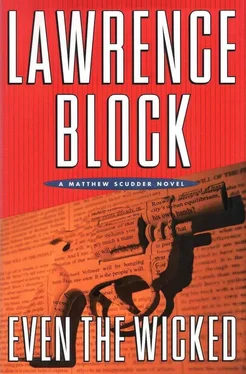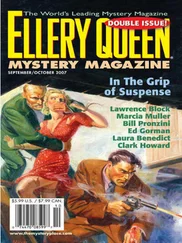“Which I’ve already done, and don’t think I didn’t pad it just a little to cover the aggravation factor. Now the question is will they pay it, and I’m not holding my breath.”
I asked him to recommend a PI in the vicinity of Arlington, Texas, and he came up with a fellow named Guy Fordyce. He was based in Fort Worth, with an office on Hemphill.
“Wherever the hell that is,” Wally said.
I reached Fordyce. He sounded gruff and competent and said he had an open slot the following morning. “I could try calling him this afternoon,” he said, “but I can’t see why I’d have any better luck than you did. Be more effective if I walk in unannounced.”
He called the next day around noon. I was out at the time and got back to find his message on my machine. I called his office and got someone who said she’d beep him. I waited, and a few minutes later the phone rang and it was him.
“Slippery little prick,” he said. “I made a couple of calls yesterday just to find out who I was dealing with, and what I learned about Gary Garrison didn’t make me yearn to go bass fishing with him. The consensus is that what he’s doing with this viatical shit is legitimate enough, but there’s something about the whole deal that makes the average citizen want to puke.”
“I know what you mean.”
“And Garrison himself has a checkered past. He sold penny stocks for a while and got sued a few times and had to face criminal fraud charges on two occasions. Charges dropped both times, but that’s not the same as saying he’s squeaky clean.”
“No.”
“There’s been some pressure locally to either outlaw these viaticals or regulate the shit out of them. Meanwhile, Garrison’s doing a hell of a business, and his end of it’s higher than a middleman’s probably ought to be. That’s one of the things they want to regulate.”
“I figured he was making out all right for himself.”
“You bet he is. So he’s in a funny position, wanting publicity because it means more sales and looking to keep a low profile for fear that the regulators are going to regulate him right out of business. And even if this particular operation’s honest, the man’s used to being a crook, so it’s second nature for him to weasel out of answering a direct question.”
“One of nature’s noblemen,” I said.
“Oh, he’s a prince. I let him start out thinking I was an investor, and then he just might have formed the impression that I was an investigator from a state agency I didn’t get around to naming, and he got real cooperative. He’s done business with your William Havemeyer three times in all. The transactions involved policies with three different insurance companies.”
He gave me names and addresses and dates and numbers. In addition to Byron Leopold, the men in whose lifespan William Havemeyer had a vested interest included a San Franciscan named Harlan Phillips and a Eugene, Oregon, resident named John Wilbur Settle. Phillips was insured by Massachusetts Mutual, while Settle’s coverage was with Integrity Life and Casualty.
“Life and casualty,” I said.
“Yeah, they go hand in hand, don’t they? I regret to say I don’t know what’s become of either of these gentlemen. Garrison can’t say if they’re alive or dead. He doesn’t follow up. Once the policy’s changed ownership and the transaction’s completed, it’s out of his hands.”
“It won’t be hard to find out the rest of it.”
“Just make a few calls.”
“Right.”
He told me what all of this was going to cost me, and said he’d put a bill in the mail. The price seemed reasonable enough, and certainly came to a good deal less than what I would have spent flying there myself. I told him as much and thanked him for his efforts.
“Any time,” he said. “Mind if I ask what you think you’re looking at here? Is your boy Havemeyer setting these people up and knocking them off?”
“That’s the way it feels,” I said. “But it all depends on what I learn from the insurance companies.”
“That’s a point. If Phillips and Settle are still alive and taking nourishment, that’d weaken the theory some, wouldn’t it?”
But they were both dead.
I got excited at first. I had a line on a serial murderer, I knew his name and where he lived, and nobody else in the world even suspected he existed. I got a rush right in the old ego. When I broke this one I’d have the media dogging me again, and this story would be national, not just local. Maybe, I thought, instead of slipping out the service entrance I ought to meet the onslaught head-on. Maybe I should welcome the attention and make the most of it.
Amazing what a mind can do if you give it half a chance. In less time than it takes to tell about it I had myself guesting on Letterman and doing a cameo on “Law and Order.” I could see myself sitting across the table from Charlie Rose, explaining the workings of the criminal mind. I just about had myself racing around the country on a book tour before it struck me that the deaths of Harlan Phillips and John W. Settle weren’t quite enough to get William Havemeyer indicted for murder.
Because they were supposed to die. They’d had AIDS, both of them, and it had been sufficiently advanced as to meet the medical criteria established by the viatical transaction brokers. Just because they were dead didn’t mean Havemeyer killed them. Mother Nature could have beaten him to the punch.
So I made some more phone calls, and what I learned saved me from having to make the tough choice between “Inside Edition” and “Hard Copy.” Harlan Phillips had died in a hospice in the Mission District, two years and eight months after having been diagnosed with AIDS, and just short of a year after assigning his Mass Mutual policy to William Havemeyer. John Wilbur Settle, treating himself to a trip abroad, no doubt with the windfall that blew his way when Havemeyer bought his policy, was one of eighty-four people drowned when a Norwegian passenger ferry caught fire, burned, capsized, and sank in the Baltic Sea.
I remembered the incident, though I hadn’t paid a great deal of attention to it at the time. I went to the library and determined that the fire had broken out as a result of a failure of the ship’s electrical system, that the ship had been carrying a load of passengers slightly in excess of its legal capacity, and that many of them were described as holiday revelers, which is often a nonjudgmental way of saying everybody was drunk. Rescue efforts were delayed as a result of a communications snafu, but were nevertheless reasonably successful, with over nine hundred passengers and crew members surviving. Of an even dozen Americans aboard, three were casualties, and the paper of record dutifully supplied their names. They were Mr. and Mrs. D. Carpenter, of Lafayette, Louisiana, and Mr. J. Settle, of Eugene, Oregon.
Somehow I couldn’t see Bad Billy Havemeyer flying off to Oslo, then sneaking aboard the SS Magnar Syversen and crossing a couple of wires in the engine room. Nor could I picture him at Phillips’s bedside in San Francisco, ripping out IVs, say, or pressing a pillow over a ravaged face.
I left the library and just walked for a while, not really paying much attention to where I was going. It was cold out and the wind had a nasty edge to it, but the air was fresh and clean the way it gets when there’s a north wind blowing.
When I got home there was a message on the machine. Marty McGraw had called and left a number. I called him back and he said he just wanted to keep in touch. What was I working on these days?
Just going around in circles, I said, and winding up back at square one.
“Be a good name for a restaurant,” he said.
“How’s that?”
“Square One. A restaurant, a saloon, place on the order of the old Toots Shor’s. Kind of joint where you can have a few pops and get a decent steak without worrying what kind of wine goes with it. Call it Square One because you know you’re always going to wind up back at it. You getting anywhere with Will?”
Читать дальше












